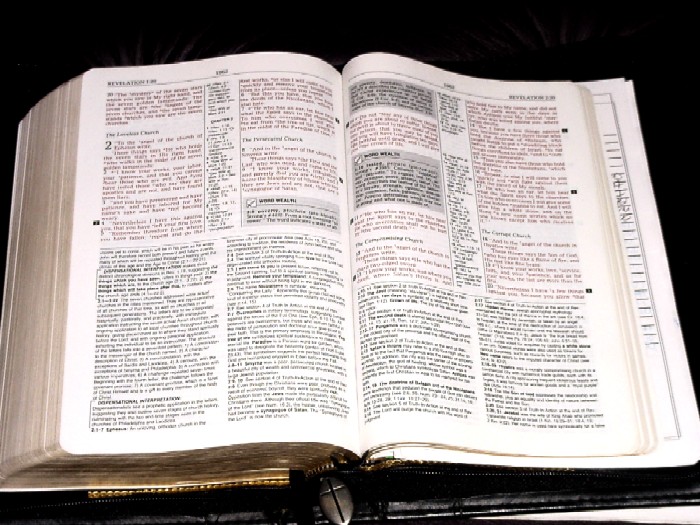|

the God of the Israelites, his name being revealed to Moses as four Hebrew consonants
(YHWH) called the tetragrammaton. After the Exile (6th century BC), and especially from the 3rd century BC on, Jews ceased
to use the name Yahweh for two reasons. As Judaism became a universal religion through its proselytizing in the Greco-Roman
world, the more common noun Elohim, meaning “god, …
Yahweh... (75 of 380 words)
http://www.britannica.com/eb/article-9077715/Yahweh
|

|

Yah·weh [ y wày ] or Jah·weh [ y wày
] or Yah·veh [ y vày ] or Jah·veh [ y vày ]
noun
Definition:
Hebrew name of God: a name of God, expanded from the four letters YHWH Tetragrammaton that form the name of God
in Hebrew
[Late 19th century. < Hebrew]
|
|
El Shaddai
in the Septuagint:
theou saddai — God Shaddai; pantokratôr (for
Shaddai) — the Almighty
Meaning and Derivation: El is another name that is translated as "God"
and can be used in conjunction with other words to designate various aspects of God's character. Another word much like Shaddai,
and from which many believe it derived, is shad meaning "breast" in Hebrew (some other scholars believe that the
name is derived from an Akkadian word Šadu, meaning "mountain," suggesting strength and power). This refers
to God completely nourishing, satisfying, and supplying His people with all their needs as a mother would her child. Connected
with the word for God, El, this denotes a God who freely gives nourishment and blessing, He is our sustainer.
Further
references of the name El Shaddai in the Old Testament: Gen 17:1; Gen 28:3; Gen 35:11; Gen 43:14; Gen 48:3
|

El Elyon
in the Septuagint:
ho theos
ho hupsistos the God most high
Meaning and Derivation: El is another name that is translated as "God" and can be
used in conjunction with other words to designate various aspects of God's character. Elyon literally means "Most High" and
is used both adjectivally and substantivally throughout the Old Testament. It expresses the extreme sovereignty and majesty
of God and His highest preeminence. When the two words are combined El Elyon it can be translated as "the most exalted
God."(Psa 57:2)
Further references of the name El Elyon in the Old Testament: Gen 14:18; Gen 14:19; Gen 14:20; Gen
14:22; Psa 57:2; Psa 78:35
|
Adonai
in the Septuagint:
kurios — Lord, Master
Meaning and Derivation: Adonai
is the verbal parallel to Yahweh and Jehovah. Adonai is plural; the singular is adon. In reference to God the plural Adonai
is used. When the singular adon is used, it usually refers to a human lord. Adon is used 215 times to refer to men. Occasionally
in Scripture and predominantly in the Psalms, the singular adon is used to refer to God as well (cf. Exd 34:23). To avoid
contravening the commandment "Thou shalt not take the name of the LORD thy God in vain" (Exd 20:7), sometimes Adonai
was used as a substitute for Yahweh (YHWH). Adonai can be translated literally as, "my lords' " (both plural and
possessive).
|
|
Yahwehin
the Septuagint:
kurios — Lord, Master
despotês — Lord,
Master, denoting the omnipotence of God (TDNT), despot, absolute ruler
Meaning and Derivation: Yahweh is the promised
name of God. This name of God which (by Jewish tradition) is too holy to voice, is actually spelled "YHWH" without
vowels. YHWH is referred to as the Tetragrammaton (which simply means "the four letters"). YHWH comes from the Hebrew
letters: Yud, Hay, Vav, Hay. While YHWH is first used in Genesis 2, God did not reveal Himself as YHWH until Exodus 3. The
modern spelling as "Yahweh" includes vowels to assist in pronunciation. Many pronounce YHWH as "Yahweh"
or "Jehovah." We no longer know for certain the exact pronunciation. During the third century A.D., the Jewish people
stopped saying this name in fear of contravening the commandment "Thou shalt not take the name of the LORD thy God in
vain" (Exd 20:7). As a result of this, Adonai is occasionally a substitute for YHWH. The following compound names which
start with "YHWH" have been shown using "Jehovah." This is due to the common usage of "Jehovah"
in the English of these compound names in the early English translations of the Bible (e.g., the Geneva Bible, the King James
Version, etc.).
|
|
Jehovah Nissi
in the Septuagint:
kurios kataphugê mou — the Lord is my refuge
Meaning and Derivation: Jehovah is translated as "The Existing One" or "Lord." The chief meaning
of Jehovah is derived from the Hebrew word Havah meaning "to be" or "to exist." It also suggests "to
become" or specifically "to become known" — this denotes a God who reveals Himself unceasingly. Nes (nês),
from which Nissi derived, means "banner" in Hebrew. In Exd 17:15, Moses, recognizing that the Lord was Israel's
banner under which they defeated the Amalekites, builds an altar named Jehovah-Nissi (the Lord our Banner). Nes is sometimes
translated as a pole with an insignia attached. In battle opposing nations would fly their own flag on a pole at each of their
respective front lines. This was to give their soldiers a feeling of hope and a focal point. This is what God is to us: a
banner of encouragement to give us hope and a focal point.
Further references of the name Jehovah Nissi in the
Old Testament: Exd 17:15
|
|
Jehovah-Raah
in the Septuagint:
kurios
poimainei me the Lord shepherds me
Meaning and Derivation: Jehovah is translated as "The Existing One" or "Lord."
The chief meaning of Jehovah is derived from the Hebrew word Havah meaning "to be" or "to exist." It also suggests "to become"
or specifically "to become known" this denotes a God who reveals Himself unceasingly. Rô'eh from which Raah derived, means
"shepherd" in Hebrew. A shepherd is one who feeds or leads his flock to pasture (Eze 34:11-15). An extend translation of this
word, rea', is "friend" or "companion." This indicates the intimacy God desires between Himself and His people. When the two
words are combined Jehovah Raah it can be translated as "The Lord my Friend."
Further references of the name Jehovah-Raah
in the Old Testament: Gen 48:15; Gen 49:24; Psa 23:1; Psa 80:1
|
Jehovah-Raah
in the Septuagint:
kurios
poimainei me the Lord shepherds me
Meaning and Derivation: Jehovah is translated as "The Existing One" or "Lord."
The chief meaning of Jehovah is derived from the Hebrew word Havah meaning "to be" or "to exist." It also suggests "to become"
or specifically "to become known" this denotes a God who reveals Himself unceasingly. Rô'eh from which Raah derived, means
"shepherd" in Hebrew. A shepherd is one who feeds or leads his flock to pasture (Eze 34:11-15). An extend translation of this
word, rea', is "friend" or "companion." This indicates the intimacy God desires between Himself and His people. When the two
words are combined Jehovah Raah it can be translated as "The Lord my Friend."
Further references of the name Jehovah-Raah
in the Old Testament: Gen 48:15; Gen 49:24; Psa 23:1; Psa 80:1
|
Jehovah Shammah
in the Septuagint:
estai to onoma autês — the name thereof
Meaning and Derivation: Jehovah is translated as "The Existing One" or "Lord." The chief meaning
of Jehovah is derived from the Hebrew word Havah meaning "to be" or "to exist." It also suggests "to
become" or specifically "to become known" - this denotes a God who reveals Himself unceasingly. Shammah is
derived from the Hebrew word sham, which can be translated as "there." Jehovah Shammah is a symbolic name for the
earthly Jerusalem. The name indicates that God has not abandoned Jerusalem, leaving it in ruins, but that there will be a
restoration.
Further references of the name Jehovah Shammah in the Old Testament: Eze 48:35
|